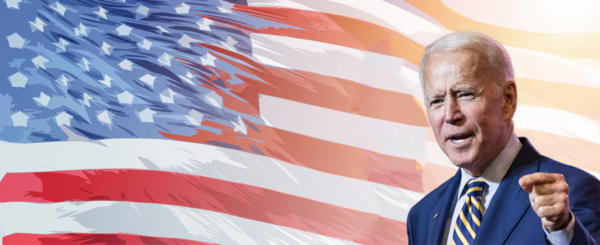
What were the biggest issues in the world last year? The 2020 U.S. presidential election would certainly be one. Before the election, Trump and Biden competed fiercely. Even after the election, Trump filed lawsuits opposing the election result, which made it difficult for Biden to take office as the new president. It is reported President Biden signed 17 executive orders on his first day in office reversing Trump’s policies. Let's take a look at the 2020 U.S. presidential election, and President Biden's actions so far after his inauguration.
2020 U.S. Presidential Election & The 46th President of the U.S., Joe Biden
On November 3rd, 2020, the presidential election of the U.S. was held. As candidates for the election, Donald Trump ran for the Republican Party as the incumbent president, with Mike Pence as vice president for re-election. For the Democratic Party, Joe Biden and Kamala Harris were nominated. The election was held amid growing interest in whether Trump would be re-elected or if Biden would be the new president. On November 7th, Joe Biden won the election by receiving 273 electoral votes.[1] The New York Times and others later reported on November 13th that Democrat nominee Joe Biden and Kamala Harris finally received 306 electoral votes and won against Trump, who received a total of 232 electoral votes.
Trump denied the election results and launched at least 35 recount lawsuits in six battleground states, including Pennsylvania and Nevada, but were all rejected. Then on December 14th, 306 electors officially voted for Biden, confirming the election victory. On January 6th, 2021, a joint session of Congress officially counted the electoral college’s votes and affirmed President-elect Joe Biden’s victory. On the same day, however, Trump's supporters who did not accept the election results breached the U.S. Capitol, which interrupted the election proceedings. Biden said it was an unprecedented assault on U.S. democracy, calling for an end of the riot, which killed a total of five protesters and police officers. Finally, on January 20th, 2021, Joe Biden was inaugurated as the 46th President of the U.S., announcing in his inaugural address that he would focus on integrating the U.S., repairing international alliances, and pursuing foreign policy to cooperate with the world.
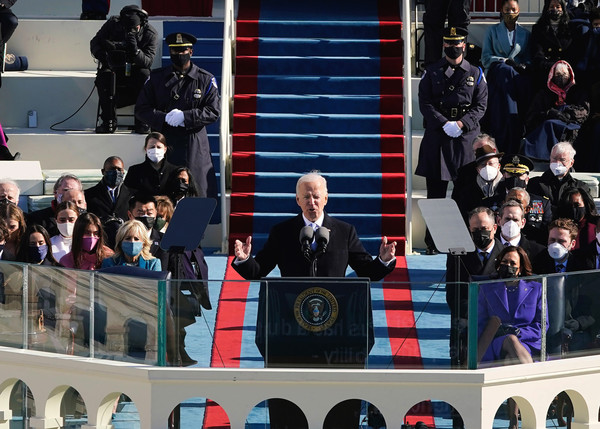
Trump vs Biden
Intense Presidential Debate 2020
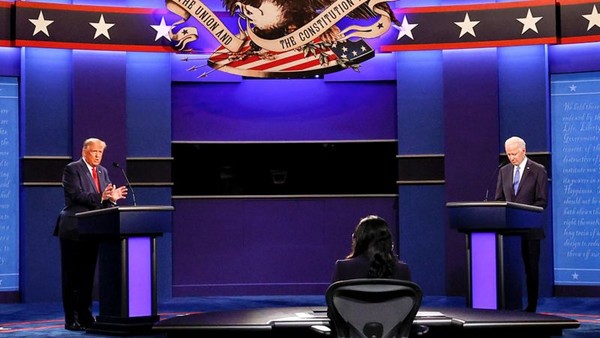
The two presidential candidates, Trump and Biden, were fiercely opposed before the election. On September 29th, the first presidential debate was held in Cleveland, Ohio, where a 90-minute heated debate took place between them on six main topics including the Supreme Court, COVID-19, the economy, race and violence, and the integrity of the election. Particularly, Biden pointed out that the Trump administration's initial response to COVID-19 failed, and Trump countered that he had successfully dealt with in terms of developing vaccines and supplying protective equipment to each region. Moreover, Biden backed postal voting in the election, but Trump claimed it was a fraud. In most other topics, the two candidates clashed, showing opposite views.
Traditionally there are three presidential debates held, and the second debate was scheduled to be held on October 15th on video due to COVID-19, but the disagreement between the two candidates over the video debate made the debate fall through. Later, on October 22nd, the last debate was held in Nashville, and like the first debate, COVID-19 was the main topic of debate. Trump stressed that there was no problem with the COVID-19 response and that vaccines would come soon, while Biden pointed out that the Trump administration's COVID-19 response was insufficient and stressed the importance of wearing a mask. In addition, Trump continued to raise suspicions that Biden profited from his son’s business dealings in Ukraine and China, and Biden countered, pointing out that Trump does not pay taxes properly even though he is rich. Furthermore, the two candidates sparred over other issues such as immigration policies and racial discrimination.
Pledge Comparison Between Two Presidential Candidates
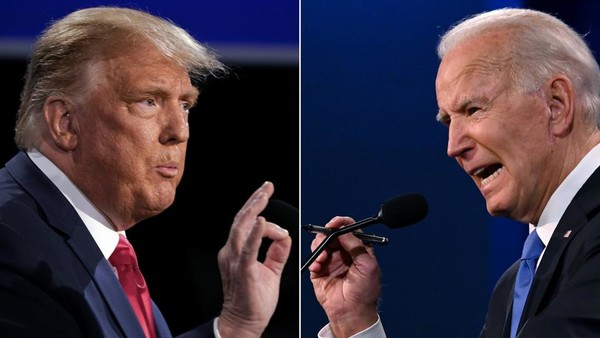
In the two candidates' major presidential pledges, there is one big difference in climate. Trump withdrew from the Paris Agreement, being skeptical of climate change. Biden, who values eco-friendly policies, said he would rejoin the Paris Agreement, which President Trump removed the US from, and use 100% eco-friendly renewable energy. He also said he would invest $2 trillion in green energy infrastructure over four years to reach net zero carbon emissions by 2050. Second, in terms of foreign policy, Trump said he would pursue protectionist trade policies, based on “American First.” For example, President Trump began the U.S.-China trade war in 2018 by imposing high tariffs on Chinese products. On the other hand, Biden emphasized the importance of multilateral agreements and cooperation with allies, focusing on repairing alliances. Third, the two candidates approached to “Buy American” differently. “Buy American” refers to the purchase of U.S. products. Trump said he wanted to support American companies by strongly imposing high tariffs on other countries such as China and the EU, while Biden said he would invest 400 billion dollars over four years for government purchase of buying American-made goods.
The table below briefly summarizes the pledges on major issues between the two candidates.
|
Trump |
Issue |
Biden |
|
Income tax, Corporations’ tax cut |
Tax |
Raise Income tax 37%->39.6%, Raise Corporations’ tax 21%-> 28% |
|
America First, Unfair Trade Agreement Revision, Protectionist trade policy |
Trade |
Multilateralism stressing cooperation with allies, Advocate Liberal trade, Pioneering New Markets for Workers and Businesses, Penalties for Countries Without Trade Agreements |
|
Plan to reduce legal immigration and international students |
Immigration |
Encompass minorities such as immigrants, Raise the annual cap on refugee admission |
|
Withdrawal of The North Atlantic Treaty Organization (NATO)[2] , U.S. troop withdrawal from Germany, Middle East, Afghanistan |
National Defense |
Advocate NATO, Halt withdrawal of U.S. troop overseas |
|
Repeal the Affordable Care Act (ACA)[3] |
Healthcare |
Protect and expand the ACA |
|
Continue Hard-line stance, Enforce implementation of the first trade agreement and seek further negotiations |
China |
Hard-line stance toward China, Importance of human rights issues, Respond in solidarity with alliance |
|
Top-Down (direct negotiations between summits), Be positive in additional U.S.-North Korea summits |
North Korea |
Bottom-Up (working-level negotiations take place first and then summit talks), Want guaranteed denuclearization |
How Would Joe Biden's America Be Different?
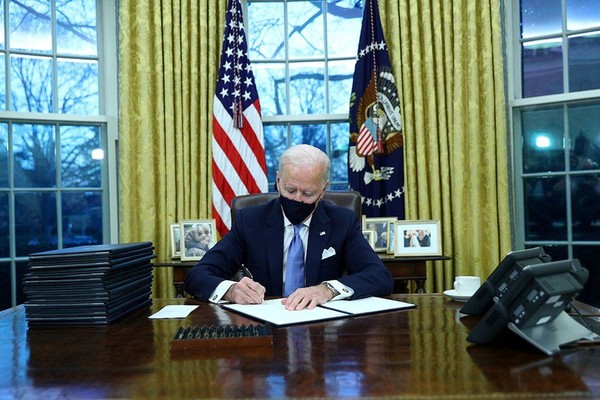
According to CNN, Biden issued 17 executive orders, presidential memoranda and agency directives, on his first day in the White House's Oval Office as he took office on January 20th; and by the 22nd, issued a total of more than 30 executive actions, reversing the former President’s policies. The executive orders signed on the first day included rejoining the Paris Agreement and the World Health Organization(WHO), and mandatory mask wearing on federal property to prevent the spread of COVID-19. Also, according to the New York Times, on January 25th, he executed his presidential campaign pledge by signing an executive order to strengthen "Buy American." This is different from former President Trump's "America First" policy focused on raising tariffs to strengthen U.S. manufacturing. The executive order is to encourage the federal government to purchase goods and services from U.S. companies, which helps rebuild domestic manufacturing. Senator Sherrod Brown added that “coupled with the Defense Production Act, it all works together.”
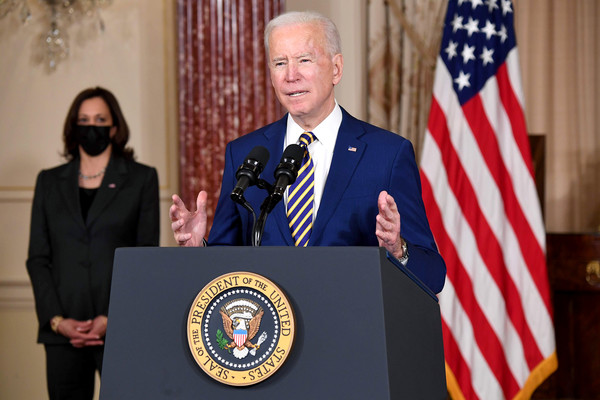
Biden delivered his first foreign policy speech after taking office at the State Department on February 4th. According to the New York Times, he said, "America is back," and that he would reverse Trump's U.S. foreign policy to rebuild alliances and engage with the world again. In order to reverse the reduction of U.S. troops overseas, which Trump pushed for, he said he would stop any planned withdrawal of U.S. troops from Germany while reviewing American Forces posture around the globe. In addition, unlike Trump's immigration policy, he said he would sign an executive order to rebuild and enhance the U.S. refugee resettlement program by raising the annual cap on refugee admission.
The 2020 U.S. presidential election drew attention from around the world, ranging from selecting candidates to confirming the winner. Although former President Trump did not accept Biden's election results and did not participate in the inauguration ceremony, Biden was inaugurated as scheduled on January 20th. At the inauguration ceremony, Biden promised to restore unity in the U.S. and to repair U.S.’s alliances and engage with the world once again. The whole world will keep attention on whether Biden will be able to bring about the unity to the U.S. and abroad as he promised.
[1] The candidate who gets more than 270 electoral votes out of a total of 538 can win the U.S. presidential election.
[2]The North Atlantic Treaty Organization(NATO): a security alliance of 30 North American and European countries established by the North Atlantic Treaty signed in 1949.
[3]The Affordable Care Act (ObamaCare): the comprehensible health care reform law and its amendment aiming to extend health insurance coverage across the U.S.

